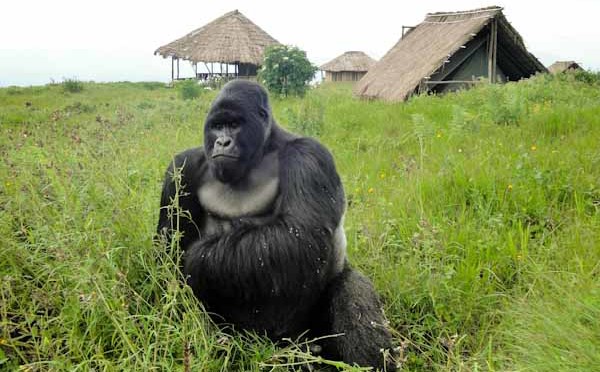‘Who gives a fuck about a fucking monkey?’
The man talking is filmed by a hidden camera, and he presents himself as ‘maybe a mercenary’. He is in the Democratic Republic of Congo as a subcontractor to the British-based multinational oil company Soco. The ‘monkey’ the man refers to is the mountain gorilla, of which some of the last representatives live in Congo’s Virunga National Park. Soco received oil drilling concessions there, and, according to its foul-mouthed local agents, the company is to make these to good use: ‘The money you could pull out of that park; it’s colossal’. The fact that this money-making would be to the detriment of the gorilla is the last of his worries.
Activist Cinema
The undercover shots of Soco-collaborators offer some of the most captivating scenes in the much-acclaimed documentary Virunga (2014). The film, directed by Orlando von Einsiedel, is well-informed and provides a good idea of the difficulties of managing a national park in the present-day Congolese context. It does have National Geographic-style shots of pristine nature, but mostly it focuses on the socio-political context of conservation in Central Africa. Apart from the continuous threat of exploitation by companies such as Soco, the documentary shows how persistent warfare between government and local rebel groups makes the most basic conservation activities virtually impossible. The story is told by following rangers and gorilla carers, but also more shadowy figures such as local politicians and international business executives.
Virunga has a clear activist undertone, and it has defended its cause with success. The media attention was immediate – partially because two days before the film’s release the park’s director, Emmanuel de Mérode, was severely wounded in an ambush by unidentified attackers. Soco came under increased pressure, amongst others of the World Wildlife Fund. The company eventually came with a statement in which it claimed to refrain from drilling in the area. Soco’s statement did not convince everyone, but it did bear testimony to the real impact of a well-crafted documentary.
Colonial legacies
The situation of Virunga National Park carries the marks of a long history. In his opening scenes, Von Einsiedel acknowledges this. Present-day shots of the park are alternated with suggestive historical footage – ranging in time from Leopold II’s Congo Free State to the Rwandan genocide. Yet, two histories remain remarkably unexplored in the documentary: the economic tradition of granting concessions and the political tradition of establishing national parks. Both date back to colonial times.
Already in Leopold’s Congo, large tracts of land were given in concession to Belgian companies, which in this way gained access to its natural resources. Such companies became indirect rulers of important parts of the Congo, a situation that was largely maintained when the colony was ceded from the king to the Belgian state in 1909. Independence in 1960 brought nationalization of parts of the economy, but the civil war of the 1990s led to a new ‘scramble for concessions’ – this time by multinational companies which, for that matter, had never been entirely absent from the region.

National parks, which were set up in Africa from the 1920s onward, were not concessions in the traditional meaning of the word. Yet, they did share some important characteristics with them, and, as such, Soco and the Virunga National Park have common roots in colonial visions of the land. The founders of national parks might have been critical about some aspects of colonial rule, but they also heavily relied on it. The Congolese national parks were traditionally run by a small number of administrators directly from Belgium, with little interference of the local authorities. Strictly regulated, the parks (like economic concessions) closed off the local population from much of the natural resources they traditionally used. In many areas, traditional inhabitants of the park areas were evicted. According to estimates by historians, several thousands of people were expelled from the Albert National Park – the predecessor of present-day Virunga. These evictions played a part in destabilizing the region, and also led to recriminations against the park from the local population. It is a legacy that still echoes today.
Of course, colonial history does not detract from the importance of conservation work in present-day Congo. It does show, however, that the challenge of the park is not limited to keeping out multinationals and rebel groups. In Virunga, a great part of the challenge consists of providing the local population access to the natural resources of the land, while at the same time safeguarding these for future generations. In order to do so, the first steps in the direction of community-based conservation are currently being taken. Partially on the initiative of the park administration, small hydro-electric plants are set up as well as local factories with a limited influence on the environment. This is only a start. A lot more will probably be needed to shake off the concession politics of the past.
o-o-o
Featured image: A mountain gorilla in Virunga national park (Innocent Mburanumwe, Wikimedia Commons)

